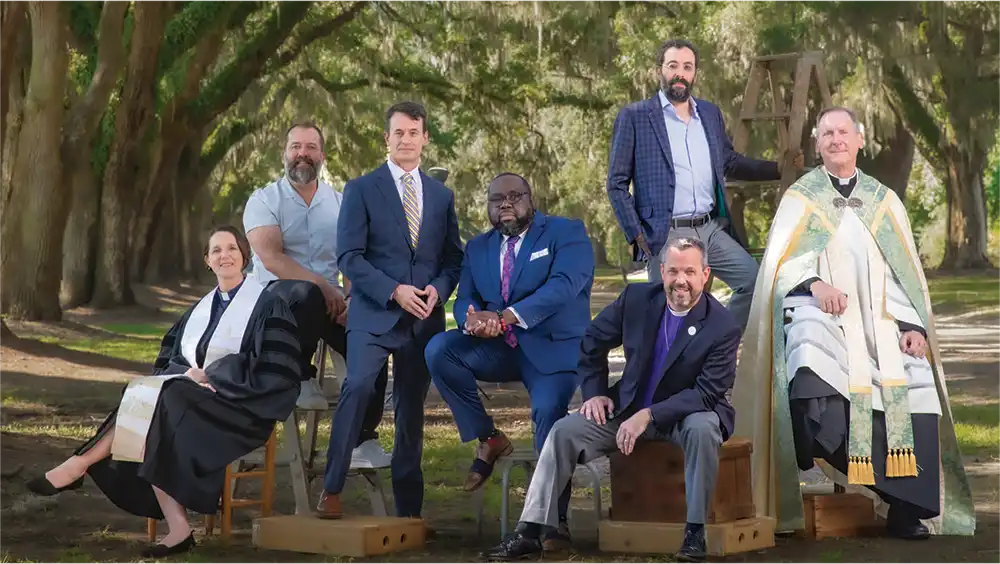
Editor’s Note: The following article is intended to show the strength of religious diversity and inclusivity across our community and how faith interconnects all of us regardless of differences in beliefs. A special thanks to St. Andrews Church, St. Clare of Assisi Catholic Church, Seacoast Church, Olive Branch AME, Chabad of Charleston, Mount Pleasant Presbyterian and The Church of Jesus Christ Church of Latter-day Saints for participating in this feature.
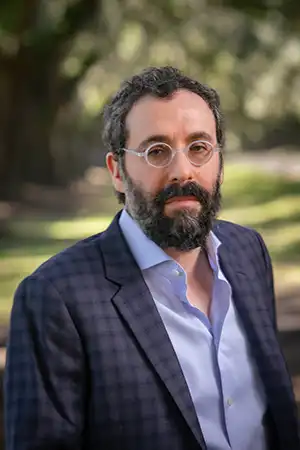
As a small child growing up in Sunderland and Leeds, England, Yossi Refson watched how his father spread joy throughout his rabbinic ministry and knew that one day he would follow this familiar path. When Refson came to the United States to study at rabbinic school in New York, he always imagined he would return to England. But when he met and married his wife, they decided to stay in America. In 2007, the Refsons moved to Mount Pleasant where they discovered there was a Jewish community searching for a hub. Working from home, the Refsons launched classes and programs and in 2016 they, along with friends from around town, built the Chabad of Charleston – Center for Jewish Life. There, according to Rabbi Refson, the mission is to find what the community wants and to make sure the Center serves those needs.
“What makes Mount Pleasant such a special place,” the Rabbi said, “Is that Christianity has been so warm towards Judaism here. I’ve never experienced this level of connection, as if we are kin. We have been embraced by our non-Jewish neighbors, many who helped build the center. Some of the children who attend our preschool are not Jewish, but their families love our traditions. And after Oct. 7, so many church members have come to help by offering security groups to protect the Center. It’s wonderful that in Charleston, we are surrounded by people who respect our heritage.
“We encourage everyone to come to the table, unplug on a Sabbath by not looking at technology, blessing the food that we eat and studying the ancient mystical teachings and family traditions that our faith celebrates. All are welcome, conversion is not necessary to become part of the Jewish community.”
The Rabbi explained that this time of year is significant because Chanukah is a celebration of when the Israeli Jews under Greek rule threw off the yoke of an oppressive regime that wouldn’t allow them to practice their religion. If Judaism had ended, the Rabbi added, Christianity would never exist. “Freely, publicly expressing gratitude for the freedom to celebrate our religion is even more special in Charleston where we have the annual menorah lighting in Marion Square, co-sponsored by the city with politicians participating in the lighting ceremony. It’s beautiful to see thousands of Jews and non-Jews come together to celebrate this tradition,” he said.
All Walks of Faith Podcast
Refson’s three brothers are all rabbis as well, and his four children are also all part of this ministry. “As torch bearers, we are bringing light to the world,” he said.
While Judaism dates back nearly 5,000 years, Catholicism evolved two millennia ago as the earliest denomination of Christianity. The word “catholic” translates from a Greek word meaning “universal,” as the same beliefs and teachings were adopted by believers across the Mediterranean where the early Jesus movement started to circulate. While other “heretical” strands of Christianity, such as Gnosticism, cropped up around the region in the first few centuries B.C, they eventually died out or were suppressed. But like a rock, Catholicism was always there.
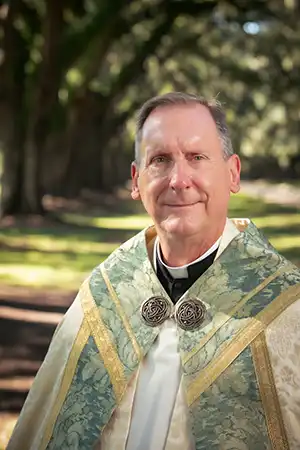
In the year 800 B.C., Charlemagne was crowned emperor on Christmas Day. Today, his 37th generational grandson Father Gregory West celebrates his family’s centuries-old Catholic legacy by leading the congregation at Saint Clare of Assisi on Daniel Island. Born and raised in Charleston, West went to Bishop England and grew up attending Stella Maris Roman Catholic Church on Sullivan’s Island, where five generations of his family before him also worshiped.
In addition to the pride Father West has for his family’s long history in the faith, he said he is passionate about his work because, “On any given Sunday, Catholics around the world, whether in Bulgaria, China or France, are all using the same words and routines in a custom of dignity and beauty. Humans crave ritual, and that is part of the religious expression, because sameness equates stability. When we celebrate mass, it’s like a time machine spanning all eternity, time and space. As our formal traditions are transcendent, mass is an expression of worship that taps into a field where there is no dimension.”
When it comes to commemorating the holidays, Father West said, “We need to focus on this indescribable, unimaginable occurrence in human history that no one could see coming and that changed history forever.” He added, “The sentiment needs to reflect divine love all year round. We can’t just save love for one another between holidays. There is a need for greater humility in the world and we need to take better care of each other.”
While Catholicism has a following of 1.2 billion believers, the foundation of its “universal” teachings was divided on Oct. 31, 1517, when Martin Luther nailed a letter bearing 95 condemnations and demands against the church to the door of the Castle Church in Wittenberg, Germany. From this revolutionary act, Protestantism evolved and the Presbyterian (derived from the Greek word for “elder”) Church was developed.
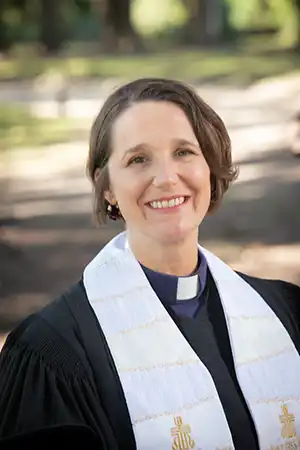
Built in 1854, the Mount Pleasant Presbyterian Church in the Old Village stands as the oldest house of worship of its denomination in the town. As the first female senior pastor and head of staff at the church, Reverend Doctor Pastor Nicole Abnour said she grew up feeling nurtured in the Presbyterian faith and always knew she wanted to explore a vocational path so that she could engage in meaningful ways with the world. “For over 50 years, women have been ordained in the church, and as such, women long before me have paved the way and made room at the table for female church leaders. As women, we have a unique worldview because we wear a variety of hats. When I step into the pulpit, I carry with me my identity and role as mother, wife, community member and over 20 years of education, which are all meaningful to the broader community.”
Pastor Abdnour added, “The unique freshness during the holiday season offers more opportunities to gather in community and for families to celebrate togetherness. We can expand goodwill by further embracing the wholesomeness of the season with the story that I have the opportunity to share about the birth, celebrating the good news that God came to the world in a real and tangible way. That message can be translated year-round into each and every day in the simplest and most common of ways.” Pastor Abdnour added that no matter what time of year, all are welcome to come visit Mount Pleasant Presbyterian and ponder in worship together.
Also rooted in the Reformation is the Anglican Church, which was founded in 1534 by King Henry VIII after Pope Clement VII denied his request for an annulment of his marriage to Catherine of Aragon. Henry’s Act of Supremacy pronounced the Church of England independent of the Catholic Church in Rome.
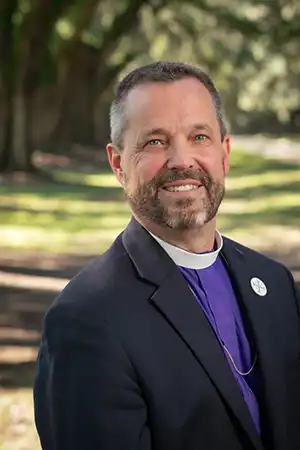
According to Archbishop of the Anglican Church in North America, Steve Wood, whose jurisdiction includes 120,000 parishioners who attend 1,000 churches across Canada, the United States, Mexico and Cuba, Anglicanism embraces a blend of its Catholic heritage and Protestantism, which offers a sense of beauty and transcendence from the faith’s fundamentally pastoral approach. “In a world where everything changes rapidly, there is something to be said about the rituals, practices, the flow of the service, communion and confession, all of which tell the stories of the Gospel,” the archbishop said. “Further, in the Anglican Church, we welcome questions as faith seeking understanding rather than doubt, intimidation or a threat. Part of our ethos is relational and conversational, and because of the high value we have for relationships and conversation, we engage with self-discovery questions in our sermons.”
Having grown up in the faith, the archbishop explained that what further attracted him to Anglicanism is its presentation. “Our liturgy is a pageant that tells a story with movements such as the vestments and the ritual of our prayer book services,” he said.
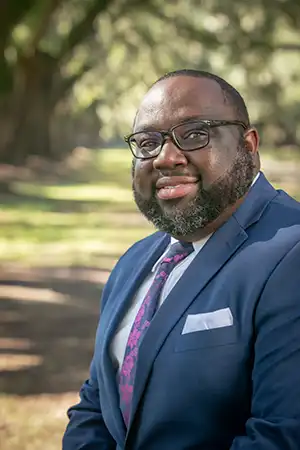
As Christianity spanned the Atlantic Ocean and found its way to our shores, not all were always welcome at certain houses of worship, however. According to Clint McPherson, Lead Pastor of the Greater Goodwill A.M.E. Church (which celebrates its 189th anniversary in February 2025), in 1794, a group of Blacks were worshiping at Philadelphia’s St. George’s Methodist Episcopal Church in a separate area from whites and were abruptly told they had to leave forever. The Blacks requested the opportunity for one last prayer before they left but were denied. As the worshippers didn’t want to lose their momentum in faith and praise and needed a place to congregate, an enslaved blacksmith named Richard Allen stepped to the front and started hosting fellowship in his shop. This movement to maintain belief “sparked the oldest black animation in the world,” Pastor McPherson said, further explaining that “The A.M.E. denomination came out of a disrupted worship service. The people did not pout or complain, we pivoted and because of this foundation, our roots, our beginnings, we are proud of where we came from. We are still standing and still serving the community, which is a testament that our faith remains.”
“The A.M.E. Church today carries forward centuries-old traditions like clapping and dancing and drums, the tambourine and sometimes a cowbell and a washboard, making joyful noise unto the Lord. It’s important to look back and see where he has brought us from: through difficulty, we have maintained faith, trust and belief, and we have more to be thankful for than to complain about. We have so much to be grateful for, so there will be a lot of noise. Our wounds have been healed, our hearts are full because even in chaotic times, God has been with us in all things, whether we are high on the mountain or low in the valley. God is with us through it all.”
As a lifelong member of the A.M.E. church, Pastor McPherson grew up in Edisto and started pastoring in 2014. “As I’ve gotten older, I’ve understood and realized we go to church to be revived, to rejoice and to remember what we have endured and overcome and be thankful,” he said, adding that, “We are blessed to be a blessing. We don’t need to wait for a holiday or a season for us to give. We have opportunities all year to do good work – and that doesn’t mean it has to be monetary. A word of encouragement, doing the right thing from the heart or being a good Samaritan can be just as important.”
Pastor McPherson also said that Greater Goodwill’s motto is that “Our church doors swing on welcome hinges and are open to everyone because the model is: God our Father, Christ our Redeemer, Holy Spirit our comforter and humankind our family.”
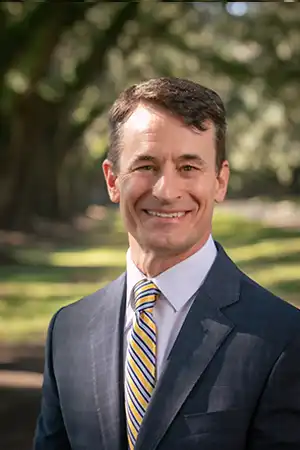
Four decades after the founding of the A.M.E. Church, The Church of Jesus Christ of Latter-day Saints was given by revelation from God to Joseph Smith in 1838, according to stake president Reed Smith, who attended four years of seminary every day before high school. After graduating from Brigham Young University, Smith traveled to Australia and Papua New Guinea as a missionary. Today, The Church has requested him to become the regional leader over all of Charleston from Walterboro to Awendaw, from the metropolitan area to Interstate 95. Working with the 12 bishops across the Charleston area, Smith helps guide The Church on what to focus on at the local level, as well as working with members through significant challenges in their lives. “I love the interaction with church members, encouraging them to treat each other in a Christlike way,” said Smith. “There is so much good in serving others, getting to know them and helping them work through the issues in their lives.”
With 150-500 members per congregation in his territory, Smith said, “We have a big focus on families, which includes a strong youth ministry program to help boys and girls learn more. We also welcome women in leadership roles just as much as men.”
Smith also emphasized The Church’s outreach program during the Christmas season, which offers a “giving machine,” a sort of vending mechanism where members can buy charitable gifts like clothes and shoes for the unhoused or low-income families to donate locally, as well as around the world (Smith added one such option could even include purchasing a goat for a family in Africa). This spirit of Christmas can be extended year-round, Smith said, because of “The Church’s service perspective such as our member and missionary outreach, delivering Bibles to share Christ’s role in our lives.”
Nearly a century after The Church of Jesus Christ of Latter-day Saints was established, America began to experience the emergence of megachurches across the country, the first being the Pentecostal Angelus Temple in Los Angeles, founded in 1923 by Aimee Semple McPherson. According to the Hartford Institute for Religion Research, a megachurch is defined as “any Protestant Christian church that draws 2,000 or more people in a weekend.”
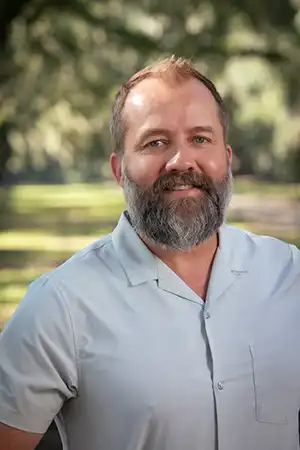
In 2014, when Josh Surrat took over the role of Lead Pastor at Seacoast Church from his father and Founding Pastor Greg Surrat, he wasn’t looking to build a megachurch, rather he and his wife Lisa Surrat were offering space for “unchurched people.” The goal, according to Lisa, who has a background as a physician’s assistant and also started the East Coast A21 Campaign to fight against human trafficking, was to build a healthy team with healthy families because she and Surrat could see the pacing of the church growing so fast that they needed to set sustainability standards that would allow the ministry to flourish for the long haul rather than burning out in the short-term. Since implementing this strategy, Seacoast has grown from 8,000-9,000 members in 2014 to 13,000 in-person attendees and 10,000 online viewers from across the country every Sunday among their 13 campuses in South Carolina and one in Asheville, North Carolina.
While Lisa was busy building the HR division, Josh focused on creating a teaching team so he could cut his preaching time in half and spend the bulk of his time stewarding the staff. “To foster trust with our congregation, it was important to build our leadership rather than showcasing one celebrity pastor,” he said.
Now as co-pastors, Josh and Lisa agreed they are both better when they’re in the same room. “Women and men are both made in the image of God. We each bring different perspectives,” Lisa said.
From the settlement of Mount Pleasant to today, all walks of Judeo-Christian faiths have served as cornerstones of the community. That the vanguards of these denominations support one another in faith, as if echoing Rabbi Refson’s word “kin,” demonstrates that valuing each other as family is at the core of our collective identity, not just during the holidays but all year round.
By Sarah Rose

Leave a Reply